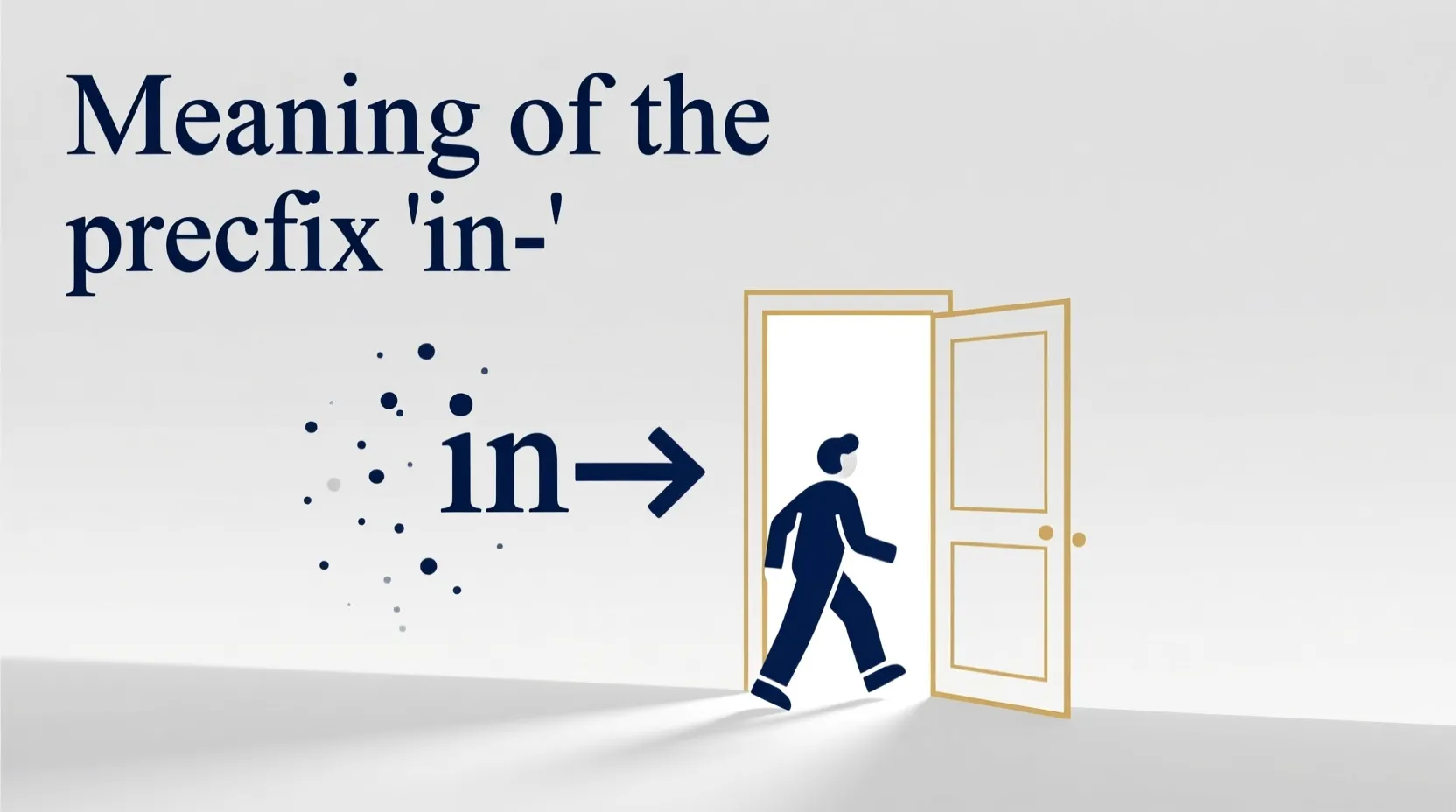Last updated on November 26th, 2025 at 06:00 am
Ever stared at a word like inactive, invisible, or incorrect and thought, “Wait… why does adding in change the entire meaning?” I remember seeing the word inappropriate as a kid and thinking it meant “in a proper way.” Spoiler: it doesn’t. 😅 That tiny prefix in completely flips the meaning — but how?
Here’s the quick breakdown:
Quick Answer: The prefix “in-” means “not,” “into,” or “inside.” It’s a formal grammar prefix, not slang, and it’s used to change or reverse the meaning of a word.
What Does the Prefix In Mean in Text?
The prefix in- has three main meanings depending on the word:
- “Not” → like in inactive (not active) or incomplete (not complete)
- “Into” → like in insert (put into)
- “Inside” → like in inborn (existing inside from birth)
It’s not a slang term — it’s a grammatical prefix used in everyday English to modify the meaning of root words.
Example sentence:
The file was incomplete, so the team couldn’t submit it.
In short: “in-” = not / inside / into = a prefix that changes a word’s meaning.
Where Is the Prefix In Commonly Used?
You’ll see in- everywhere in English — in texting, academic writing, social media, and professional communication — but it’s NOT slang.
Here’s where it commonly appears:
- 📘 School / academic writing (e.g., inaccurate, inefficient)
- 💼 Work emails and reports (e.g., incomplete, inconsistent)
- 📱 Texts and social media, only as part of words
- 📚 Books, articles, newspapers
- 💬 General everyday English
Tone:
- ✔️ Formal and standard
- ✔️ Not casual slang
- ✔️ Not flirty
- ✔️ Not internet shorthand
Examples of the Prefix In in Conversation
Here are simple, natural examples showing how words with in- appear in everyday chats:
A: is your assignment done?
B: not yet, it’s still incomplete 😅
A: why didn’t the device turn on?
B: idk, the connection seems inaccurate
A: this picture looks invisible in low light
B: yeah the lighting is too dim 😭
A: his story sounds inconsistent
B: exactly, something feels off
A: the app keeps behaving incorrectly
B: same here, it’s glitching today
A: the taste is so intense
B: yep, instantly strong lol
Even though these messages use the prefix, notice that people aren’t using in- as slang — it’s just part of regular words.
When to Use and When Not to Use the Prefix In
✅ When to Use “In-”
- To show negation (not / opposite)
- To describe something inside or within
- When you want a formal or academic tone
- In professional writing
- In everyday English to clarify meaning
❌ When Not to Use “In-”
- When texting slang — it’s not a slang prefix
- When the root word already has a specific negative prefix (like un- or im-)
- When the word becomes grammatically incorrect
- In very casual chats where simpler words are better
- When the negative meaning becomes unclear
Usage Comparison Table
| Context | Example Phrase | Why It Works |
|---|---|---|
| Friend Chat | “the data seems inconsistent 😅” | Casual but clear meaning |
| Work Chat | “The report is incomplete.” | Professional and precise |
| “Please review the incorrect entries.” | Formal, clear, and direct | |
| Academic | “The results were inaccurate.” | Standard academic vocabulary |
Similar Slang Words or Alternatives
Even though in- itself isn’t slang, here are similar prefixes and alternatives that express negativity or direction.
| Slang / Word | Meaning | When to Use |
|---|---|---|
| un- | not / opposite of | Everyday words (unhappy, unclear) |
| im- | not / opposite of (before b, m, p) | Words like impossible, immature |
| ir- | not / opposite of (before r) | Words like irregular, irrelevant |
| dis- | not / opposite / undo | Words like dislike, disconnect |
| non- | not / without | More formal or technical contexts |
| inside / inward | inner direction | When you want a simpler, direct phrase |
FAQs About the Prefix In
Is “in-” a slang word?
No. It’s a grammatical prefix used in standard English.
Does it always mean “not”?
Mostly, but not always. It can also mean into or inside.
Is it the same as “un-”?
Often, yes. Both mean “not,” but the correct prefix depends on the root word.
Why does “in-” sometimes change to “im-” or “ir-”?
Because of pronunciation rules prefixes adjust to fit the sound of the word.
Is “in-” formal?
Yes. It’s used in academic, professional, and everyday English.
Discover More Artical
- 90+ WYM Meaning in Text Explained: The Ultimate Beginner’s Guide
- What Does the Name Alexander Mean and Why It’s Still So Popular Today
- What Does the Name Anna Mean? History, and Beautiful Meanings

Matthew Porter is an avid puzzler whose love for brain teasers knows no bounds. Known for his creativity and analytical thinking, Matthew enjoys crafting and deciphering puzzles that challenge the mind. His engaging and thought-provoking content is a favorite among Puzzlerpedia readers.










